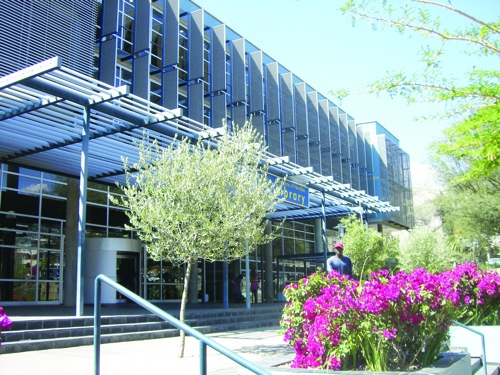When you picture someone in a library, perhaps you’d think of a depressed librarian organising books on a shelf surrounded by whispered chatter, the occasional sound of turning pages and the clatter of fingers on keyboards.
Because of this, you feel library science is not worth studying because of the perceived lack of excitement and many other reasons.
Sadly enough, the youth find money-making careers more appealing to their needs and shy away from anything to do with a library, but there is one thing you should remember: do not underestimate the power of Library Science.
For those who do not know, Library Science is a combination of fields that applies the “practice of perspectives and tools of management, information technology, education, and other areas to libraries; the collection, organisation, preservation, and dissemination of information resources; and the political economy of information.”
In simpler terms, Library Science uses some aspects from other fields and uses them in areas where you can put away information. There is a long list of careers in this field and remember, it is not only restricted to a library. People who work in a library aren’t always referred to as librarians either. Museums, companies and other places where you are able to keep a large amount of information also employ Library Science degree holders because they specialise in this type of job.
Read on if you want to find out more about the power of Library Science.
Have you ever gone into a library and wondered what the symbols and letters on every book meant? This is called the Dewey Decimal Classification System created by American Melvil Dewey in 1876. Pretty old, right? This system is used in Namibia as well. Books are placed on shelves according to different classes (for example language or literature) and various tables. You can easily Google this information if you would like to find out more about it.
Other classification systems include the Library of Congress Classification (LCC) and the Colon Classification (CC) but this is only limited to the English language. Other languages have their own classification systems, such as the Russian language which uses the Russian Library-Bibliographical Classification (BBK) because not all the alphabets in every language are the same.
As you know, behind every career, there is a story as to how it developed. Library Science has a rich history, ranging from where it originated to the modern-day techniques used to catalogue, access and use information in a legal way.
Lucky enough at the University of Namibia (Unam), students are given the opportunity to partake in an internship, allowing them to observe what happens in the workplace and involve themselves in practical experience. Internships are great ways for potential employers to recognise your skill and if you impress your boss enough, he/she might employ you permanently.
Some of a librarian’s duties include maintaining or preserving certain information such as books, magazines, newspapers, recordings in an audio or video format as well as photographs and maps. A librarian is also responsible for training people in computer studies – especially when it comes to finding information, so they’d make pretty great spies, don’t you think?
Librarians also help to train people in basic literacy education, which means they can help you with the fundamentals of reading. In modern times, librarians have been educated on how to deal with people who have disabilities and assist them when it comes to using the library resources too.
Ever heard of archivists? These are professionals who store and archive (back up) information on servers or shelves so that it can be used in the long run. The Namibian newspaper also has its own Resource Centre where information is constantly preserved ever since the newspaper was first published.
Online access is available on the newspaper’s website and archivists created a system allowing you to find what you are looking for by date, topic or keyword. This type of career is permanent because every day more information becomes available and it’s up to the archivists to carefully maintain them otherwise they could get lost or damaged.
Senior librarian in the Otjozondjupa Region, Belinda Lizazi-Mbanga, explained the shortages in this occupation, especially in Namibia.
“We are running out of librarians and I believe it’s a matter of discouragement by parents to allow their children into this kind of career. Library Science is a field like any other, but it’s a matter of just motivating pupils to join it.”
Remember, Library Science is not only limited to libraries and there is a brilliant opportunity to start your own business. Although a reading culture, especially among the youth, hasn’t quite been established yet, there are people who are still willing to buy a couple of local novels. Namibian novels are mostly available in Windhoek or Swakopmund, but starting a stall or even writing your own book is a good way to get yourself out there.
“We are few and there are many vacancies. Some people end up studying Library Science and end up diverting because they think they will just end up in a library but there are many aspects,” Belinda says.
Ask your Media Studies teacher a few questions on what he/she had to study and if you are serious and dedicated about Library Science, study hard and you will soon be on your way to becoming the greatest information scientist the country has ever seen!
• Library Science is also known as Library Information Science.
• Did you know that Library Science offers a diploma, degree and honours degree at Unam?
• Librarians are often appreciated by authors in the acknowledgement section of their novels. Sounds like a once in a lifetime opportunity, don’t you think?
• If you were ever a media prefect and you loved the job, a career in Library Science will be a perfect job for you.
• Don’t limit yourself – study hard to become a library systems manager or open your very own book store because you’ll have the experience and knowledge on how to preserve your books.
– Additional information from http://en.wikipedia.org/wiki/Library_science
Stay informed with The Namibian – your source for credible journalism. Get in-depth reporting and opinions for
only N$85 a month. Invest in journalism, invest in democracy –
Subscribe Now!






